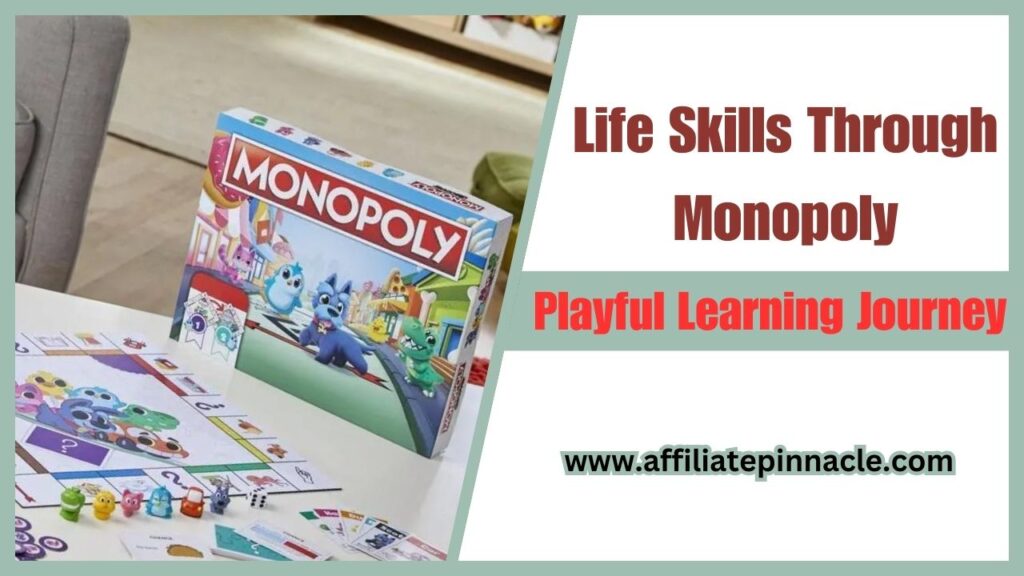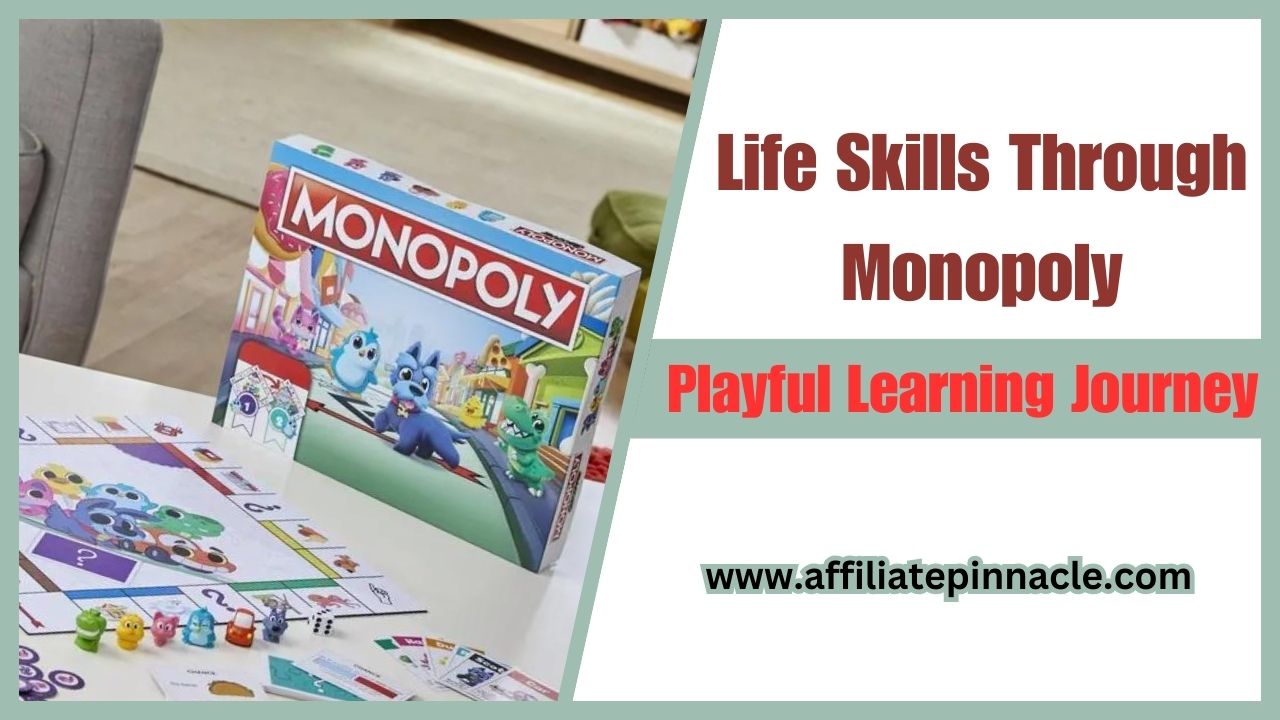Monopoly, the iconic board game, has transcended generations, captivating players with its blend of strategy, luck, and negotiation. Beyond its entertainment value, Monopoly serves as an unexpected yet effective tool for mastering vital life skills, particularly in the realms of finance and decision-making. Here are five key ways in which this playful game becomes a gateway to crucial life lessons:

“Cash Flow Explosion: Start Earning Big Bucks TODAY – Absolutely FREE Training!”
1. Financial Literacy in Action: At its core, Monopoly simulates real estate transactions, cash management, and risk assessment. Players engage in buying and selling properties, collecting rent, and handling money. This hands-on experience allows individuals to grasp the fundamentals of financial literacy in a practical, tangible manner, laying the groundwork for better money management skills in adulthood.
2. Strategic Decision-Making: Monopoly demands strategic thinking. Every move involves evaluating options, anticipating outcomes, and adjusting tactics accordingly. Players learn to make calculated decisions considering the trade-offs, a skill invaluable in personal finance, investments, and career choices.
3. Negotiation and Communication Skills: A cornerstone of Monopoly is negotiation. Players bargain, trade, and persuade to strike deals beneficial to their strategy. This fosters the development of negotiation skills, the ability to articulate one’s position, and the art of compromise—essential skills in financial transactions, business dealings, and everyday interactions.
4. Risk Management and Resilience: The game introduces the concept of risk. Players encounter setbacks, face financial challenges, and experience unexpected windfalls. Learning to navigate these fluctuations teaches the importance of risk management and resilience in handling financial setbacks and adapting to changing circumstances.
5. Patience and Long-Term Planning: Monopoly is not won in a single turn but through consistent, calculated moves. Players learn to balance short-term gains with long-term objectives, understanding the value of patience and strategic planning. This skill of delayed gratification is pivotal in financial investments, career advancements, and personal goals.
In essence, Monopoly goes beyond a mere pastime; it’s a simulator for life’s financial complexities and decision-making dilemmas. By engaging in the gameplay, individuals inadvertently immerse themselves in a world where these skills are not just advantageous but essential. From understanding the dynamics of money to navigating the intricacies of negotiation and risk, Monopoly offers a playful yet profound journey towards mastering finance and life skills that extend far beyond the game board.
Financial Literacy in Action
Financial literacy might sound dull, but it’s like your personal superpower for navigating the exciting, sometimes confusing world of money. It’s not just about numbers and boring spreadsheets; it’s about taking charge of your financial future and feeling empowered to make smart choices. Ready to level up your financial game? Here are 5 practical steps to put your financial literacy into action
“Cash Flow Explosion: Start Earning Big Bucks TODAY – Absolutely FREE Training!”
1. Track Your Spending: Knowledge is power, and that starts with knowing where your money goes. Track your income and expenses for a month to see where your cash is flowing. Use a budgeting app, a simple notebook, or even just a colorful chart – whatever works for you! Once you see your spending patterns, you can identify areas to save or adjust.
2. Budget Like a Boss: Think of a budget as your financial roadmap. It helps you allocate your income towards your goals, whether it’s saving for a dream vacation, buying that new gadget, or preparing for college. There are plenty of budgeting methods out there, so find one that fits your lifestyle and personality. Remember, your budget isn’t a rigid rulebook; it’s a flexible tool you can adapt as your needs change.
3. Goal Crusher: What do you want to achieve with your finances? Having clear goals gives you direction and motivation. Maybe you want to build an emergency fund, pay off debt, or invest for the future. Break down your big goals into smaller, achievable steps, and celebrate your milestones along the way!
4. Debt Detective: Debt can be a helpful tool, but it’s important to manage it responsibly. Understand the different types of debt, interest rates, and repayment terms. Compare options before taking out any loans, and always prioritize paying off high-interest debt first. Remember, being debt-free opens up so many financial possibilities!
5. Knowledge is Key: The more you learn about personal finance, the more confident you’ll feel making informed decisions. Read articles, watch videos, attend workshops, or even take a financial literacy course. Don’t be afraid to ask questions and seek help from trusted adults or financial professionals.
Remember, financial literacy is a journey, not a destination. There will be ups and downs, but with each step you take, you’re building a brighter financial future for yourself. So, grab your financial toolkit, embrace the adventure, and watch your financial confidence soar!
Strategic Decision-Making
Life is full of choices, from picking what to eat for breakfast to deciding on a future career path. But how do you make sure you’re making the best choices, the ones that lead you to where you want to go? That’s where strategic decision-making comes in.
Think of strategic decision-making as your personal superpower for navigating life’s crossroads. It’s not about magic or mind-reading; it’s about a systematic approach that helps you weigh your options carefully and confidently.
“Cash Flow Explosion: Start Earning Big Bucks TODAY – Absolutely FREE Training!”
Ready to unlock your inner strategist? Here are 5 steps to guide you:
1. Define Your Goal:
Before diving into options, ask yourself: what do I want to achieve? Is it getting a good grade on a test, winning a game, or making new friends? Having a clear goal keeps you focused and prevents detours.
Image of a person standing at a fork in the road, looking at two paths with different landscapes in the distance.
2. Gather Information:
Think of information as your decision-making fuel. Research your options, talk to people you trust, and consider different perspectives. The more informed you are, the better equipped you’ll be to make a sound choice.
Image of a person sitting at a desk with a laptop open, books piled around them, and a person talking to them.
3. Weigh the Pros and Cons:
List out the potential benefits and drawbacks of each option. Consider not just the immediate outcome, but also the long-term consequences. Is there an option that aligns with your values and goals?
Image of a person holding a scale with two different objects on each side.
4. Make Your Choice:
Once you’ve weighed your options carefully, it’s time to make a decision. Trust your gut, but don’t be afraid to adjust your course if needed. Remember, even the best plans sometimes require flexibility.
“Cash Flow Explosion: Start Earning Big Bucks TODAY – Absolutely FREE Training!”
Image of a person making a determined fist.
5. Evaluate and Learn:
Every decision is a learning experience. Reflect on what worked well and what didn’t. Did you achieve your goal? What could you have done differently next time? By learning from your experiences, you’ll become a more confident and strategic decision-maker.
Negotiation and Communication Skills
Negotiation isn’t just for high-powered business deals; it’s a valuable skill for everyday life, from convincing your friends to try a new restaurant to advocating for yourself in class.
Think of communication and negotiation as your toolbox for building positive relationships and getting what you want (and need) in a way that benefits everyone.
“Cash Flow Explosion: Start Earning Big Bucks TODAY – Absolutely FREE Training!”
Here are 5 key tools to keep in your toolbox:
1. Empathy: Seeing things from the other side.
- Imagine yourself in the other person’s shoes. What are their goals and concerns?
- Active listening is key – pay attention to both their words and body language.
2. Clear communication: Expressing yourself effectively.
- Be specific and avoid jargon.
- Focus on your needs and interests, not accusations or blame.
- “I statements” can be helpful: “I feel frustrated when…” instead of “You always…”
3. Problem-solving: Finding solutions that work for everyone.
- Brainstorm multiple options together.
- Be willing to compromise and find common ground.
- Focus on the future and moving forward.
4. Respect: Treating everyone with dignity.
- Even if you disagree, be polite and considerate.
- Avoid personal attacks or making assumptions.
- Remember that everyone deserves to be heard and respected.
5. Assertiveness: Standing up for yourself with confidence.
- Believe in your worth and your right to have your needs met.
- Don’t be afraid to say no if something isn’t right for you.
- But be open to changing your mind if presented with new information.
Risk Management and Resilience
Life is an exciting adventure, but it’s not always smooth sailing. Unexpected challenges and setbacks can come our way, from missed deadlines and lost friendships to major upheavals like natural disasters or personal crises. But fear not! By developing strong risk management and resilience skills, you can navigate life’s twists and turns with confidence and grace.
“Cash Flow Explosion: Start Earning Big Bucks TODAY – Absolutely FREE Training!”
Risk Management: Planning for the Unexpected
Think of risk management as building a sturdy raft for your life journey. It’s about preparing for potential storms and rough waters so you can stay afloat and reach your destination. Here are some key steps:
1. Identify Your Risks:
- Personal risks: Think about your health, relationships, and academics. What could potentially go wrong in these areas?
- External risks: Consider things like natural disasters, economic downturns, or technological disruptions.
2. Assess the Likelihood and Impact:
- Not all risks are created equal. Some are more likely to happen than others, and some will have a bigger impact on your life. Prioritize your risks based on these factors.
3. Develop Strategies:
- Once you know your risks, brainstorm ways to mitigate them. This could involve saving for emergencies, building strong social connections, or learning new skills.
4. Take Action:
- Don’t just plan, do! Implement your risk management strategies and make them part of your daily routine.
Building Resilience: Bouncing Back from Challenges
Even with the best preparation, life can throw curveballs. That’s where resilience comes in. Resilience is your ability to bounce back from setbacks, adapt to change, and overcome adversity. Here are some ways to build your resilience:
“Cash Flow Explosion: Start Earning Big Bucks TODAY – Absolutely FREE Training!”
1. Develop a Positive Mindset:
- Believe in your ability to handle challenges and overcome obstacles.
- Focus on the things you can control and let go of what you can’t.
- Practice gratitude for the good things in your life.
2. Build Strong Support Systems:
- Surround yourself with positive and supportive people who will be there for you when times are tough.
- Don’t be afraid to ask for help when you need it.
3. Learn from Your Experiences:
- Every setback is an opportunity to learn and grow.
- Reflect on what went wrong and what you could do differently next time.
- Use your experiences to build your strength and resilience.
4. Take Care of Yourself:
- Prioritize your physical and mental health.
- Make time for activities you enjoy and that help you relax.
- Get enough sleep and eat a healthy diet.
Bonus Tips:
- Celebrate your successes! Taking the time to acknowledge your accomplishments, big or small, can boost your confidence and resilience.
- Be kind to yourself. Everyone makes mistakes and goes through tough times. Don’t be too hard on yourself when things get tough.
- Remember, you’re not alone. Everyone faces challenges in life. Seek out support groups, online communities, or even therapy if you need additional help.
By developing strong risk management and resilience skills, you can approach life with confidence, knowing you have the tools to weather any storm. So, grab your metaphorical raft and paddle on! The journey ahead may be challenging, but with the right tools, you can navigate it with courage, adaptability, and a smile.
Patience and Long-Term Planning
Patience and long-term planning stand as pillars of success in a fast-paced world that often glorifies instant gratification. They form the bedrock upon which achievements, both personal and professional, are built. Here are five key aspects highlighting the significance of patience and long-term planning in our lives:
“Cash Flow Explosion: Start Earning Big Bucks TODAY – Absolutely FREE Training!”
1. Cultivating Resilience in Adversity
Patience fosters resilience. In moments of adversity, the ability to remain composed and patient allows individuals to weather storms with grace. Long-term planning helps anticipate and prepare for these challenges, ensuring that setbacks are viewed as temporary hurdles rather than insurmountable roadblocks.
2. Achieving Sustainable Success
Success built on impulsive decisions often lacks durability. Patience encourages a deliberate, thoughtful approach to decision-making. Long-term planning ensures that goals are not hastily pursued but are part of a well-thought-out strategy, fostering sustainable success in the long run.
3. Developing Emotional Intelligence
Patience requires emotional intelligence—the capacity to understand, manage, and express emotions effectively. It allows individuals to respond rather than react impulsively. Long-term planning cultivates the ability to regulate emotions, aiding in making pragmatic decisions based on foresight rather than momentary emotions.
4. Building Strong Relationships
Patience is the bedrock of healthy relationships. Whether personal or professional, nurturing connections requires understanding, tolerance, and the willingness to invest time and effort. Long-term planning within relationships ensures that they evolve and strengthen over time, fostering trust and mutual growth.
5. Financial Stability and Growth
Patience in financial matters breeds prudence and restraint. Long-term planning, especially in investments and savings, allows for compounding effects and steady growth. It shields individuals from impulsive decisions driven by market fluctuations, fostering financial stability and wealth accumulation over time.
In essence, the fusion of patience and long-term planning is not merely a trait but a skill—a skill that paves the way for a more fulfilling and successful life journey. It’s the art of understanding that greatness doesn’t manifest overnight but through consistent efforts and calculated strategies. Embracing patience and adopting a long-term outlook empowers individuals to navigate challenges with resilience, build enduring success, foster meaningful relationships, and secure a stable financial future. As we learn to appreciate the power of patience and invest in long-term planning, we embark on a transformative journey toward a more fulfilling and prosperous life.
“Cash Flow Explosion: Start Earning Big Bucks TODAY – Absolutely FREE Training!”
I appreciate you reading my full article, Mastering Finance and Life Skills Through Monopoly: A Playful Learning Journey




Thank you for your sharing. I am worried that I lack creative ideas. It is your article that makes me full of hope. Thank you. But, I have a question, can you help me?